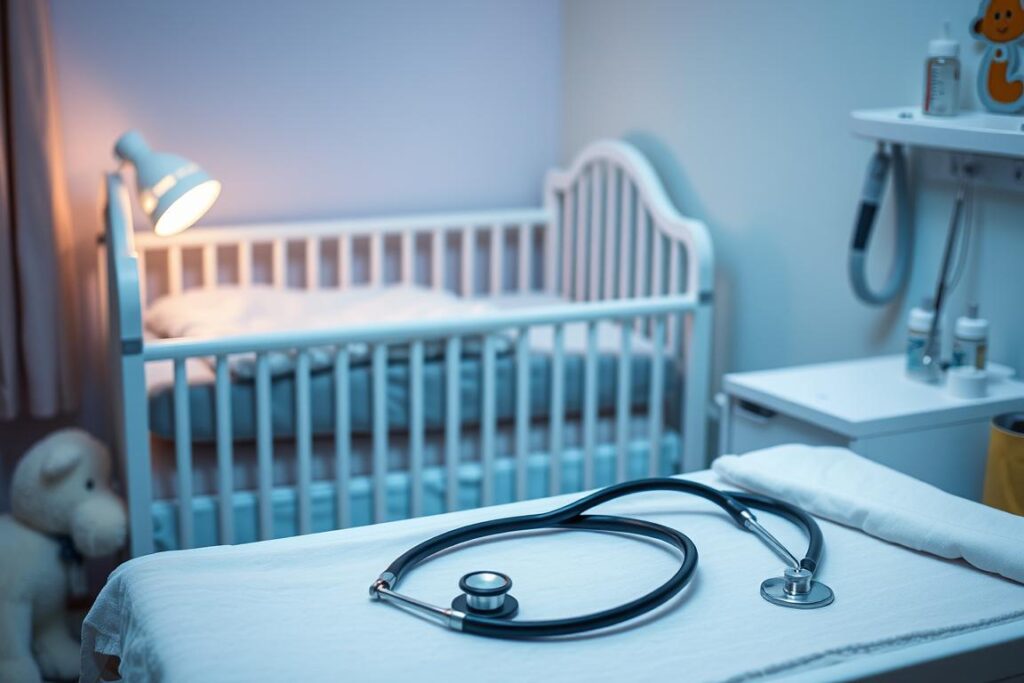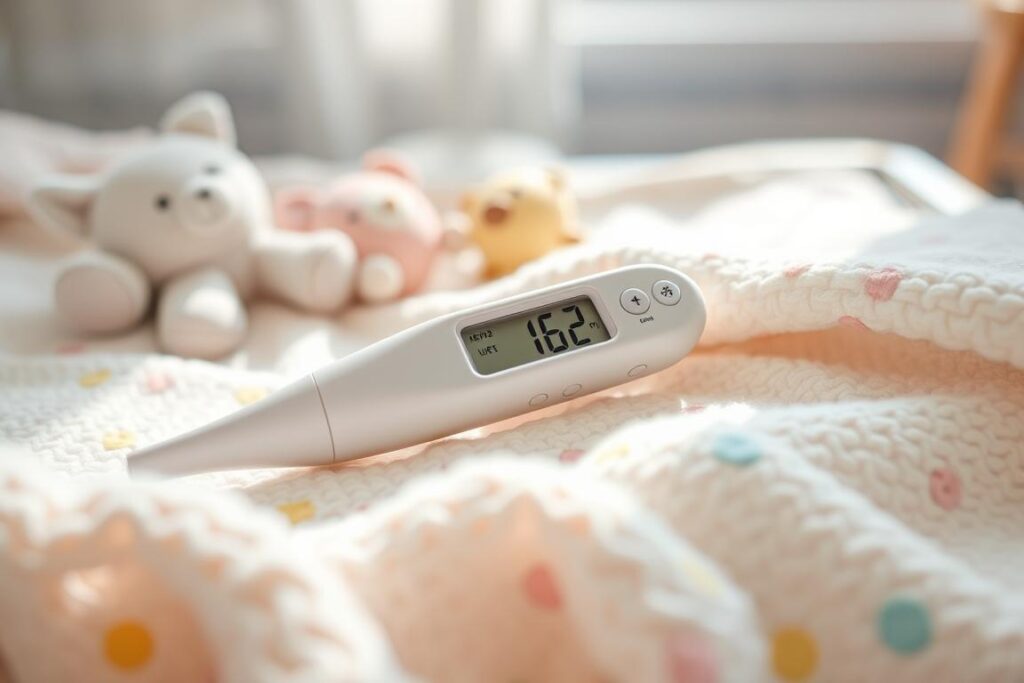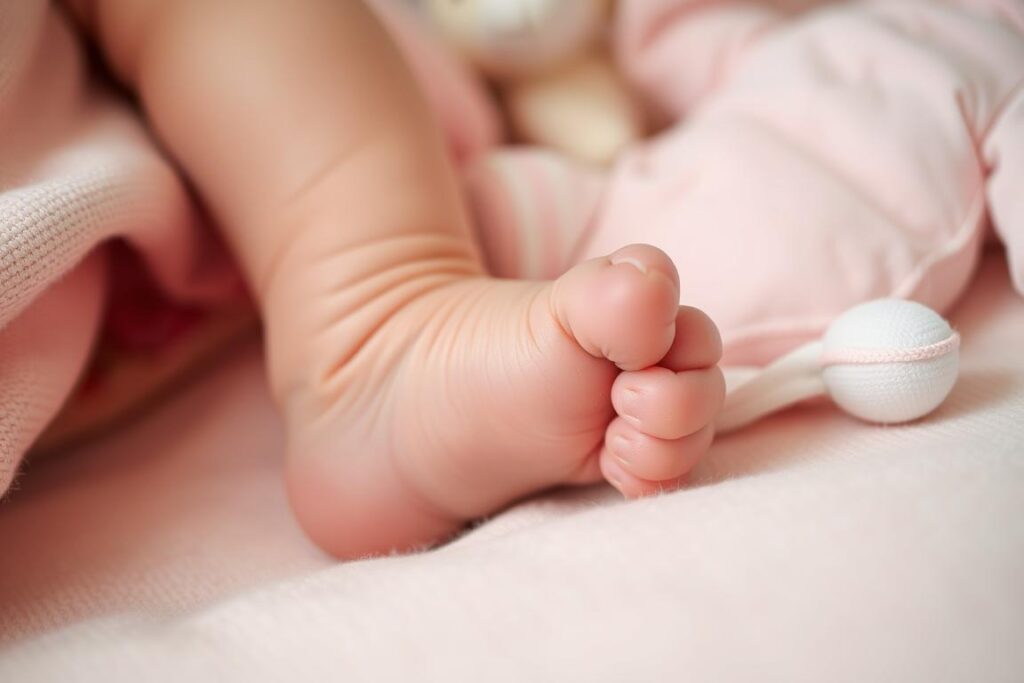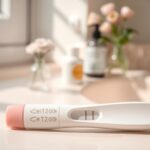First Days Home With Baby: The first days and weeks at home with your newborn are a mix of joy and adjustment, filled with precious moments of bonding as you settle into life together. During this time, it’s also essential to keep a close eye on your baby’s health.
Knowing when to call the doctor is key. This ensures your newborn gets the care they need fast. It helps address any issues quickly.
In the first days, getting to know your baby’s normal behaviors and milestones is important. It’s also crucial to know the red flags that mean you should call the doctor right away. Understanding these differences empowers you to make smart health choices for your child.
By knowing what’s normal and what’s not, you can act fast if something seems off. This way, you can keep your baby safe and healthy.
Key Takeaways
- Recognize the signs that warrant a call to the pediatrician in the first days at home with your newborn
- Understand the difference between normal newborn behaviors and concerning symptoms that require medical attention
- Be proactive in monitoring your baby’s health and well-being during the crucial early days at home
- Trust your parental instincts and don’t hesitate to seek professional guidance when you have concerns about your newborn’s health
- Stay vigilant and be prepared to act quickly if you notice any red flags or changes in your baby’s condition
Understanding Normal vs. Concerning Symptoms in Newborns
Being a new parent is both exciting and challenging. It’s important to know the difference between normal baby behavior and signs that need medical help. We’ll look at what’s usual, when to worry, and why listening to your gut is key.
Common Normal Newborn Behaviors
Newborns do many things that are perfectly normal. These include:
- Frequent feeding and sleeping cycles
- Sneezing, yawning, and hiccupping
- Irregular breathing patterns and grunting noises
- Crossed or wandering eyes
- Fussiness and crying episodes
Red Flags That Require Medical Attention
Some signs mean your baby might need to see a doctor. Watch for these red flags and call your pediatrician:
- Persistent crying or inconsolable fussiness
- Difficulty breathing or labored breathing
- Fever or abnormal temperature changes
- Extreme lethargy or difficulty waking the baby
- Significant changes in eating or sleeping patterns
- Unusual skin discoloration or rashes
- Umbilical cord concerns, such as redness or discharge
When to Trust Parental Instincts
You know your baby best. If something seems off or you feel worried, call your pediatrician. Your instincts can spot things that might not be obvious. Trusting your gut and getting medical advice is crucial for your baby’s health.
Every baby is different. What’s normal for one might not be for another. Stay alert, trust your instincts, and work with your pediatrician to keep your newborn healthy.
Fever and Temperature Changes in Infants
As a new parent, knowing about baby fever and infant temperature is key. It’s vital to learn how to use a newborn thermometer right. Also, knowing when a high temperature needs a doctor’s visit is important.
Newborns often have small changes in temperature, which is normal. Their body temperature can be between 97°F (36.1°C) and 100.3°F (37.9°C). A fever is when their temperature goes over 100.4°F (38°C), especially for babies under 3 months.
| Temperature Reading | Interpretation |
|---|---|
| Below 97°F (36.1°C) | Low body temperature, may require medical attention |
| 97°F (36.1°C) to 100.3°F (37.9°C) | Normal temperature range for newborns |
| Above 100.4°F (38°C) | Fever, requires medical evaluation |
It’s important to use a newborn thermometer made for infants. They are more accurate than other thermometers. The best way to check your baby’s temperature is rectally, as it gives the most accurate reading.
If your infant’s temperature is over 100.4°F (38°C), call your pediatrician right away. Fever in newborns can mean a serious problem and needs quick medical help.
First Days Home With Baby: Essential Health Monitoring
Starting to care for your newborn means keeping a close eye on their health. A daily routine to track vital signs and overall health is key. It gives you valuable insights and peace of mind in those first days at home.
Daily Health Check Routine
It’s important to do a detailed health check on your baby every day. This should include:
- Checking temperature, respiration rate, and heart rate
- Inspecting skin for any changes, rashes, or discoloration
- Observing feeding, urination, and bowel movements
- Monitoring alertness, activity levels, and sleep patterns
Recording Baby’s Vital Signs
Accurate records of your baby’s vital signs are crucial. They help spot any trends or changes. Consider using a baby health monitoring device or a newborn health app to track your infant’s vital signs regularly.
Using Baby Health Tracking Apps
Many apps are designed to help parents monitor their baby’s health and growth. These apps often have features like:
- Temperature and feeding trackers
- Developmental milestone checklists
- Personalized growth charts
- Integrated healthcare provider communication
Using these digital tools daily helps you stay on top of your baby’s health. You can quickly spot any issues that need medical attention.
“Consistent monitoring and record-keeping are key to ensuring your newborn’s well-being in those crucial first days at home.”
Breathing Problems and Respiratory Concerns
As new parents, it’s natural to worry about your baby’s breathing. Most newborn breathing issues are not serious, but it’s important to know when to worry. Understanding normal and concerning breathing behaviors helps keep your baby safe in those early days.
Normal Newborn Breathing Patterns
Newborns breathe in a unique way that might seem odd at first. They often breathe fast and shallow, then slow and deep. It’s normal for them to pause briefly, known as periodic breathing, which usually lasts under 10 seconds.
Recognizing Respiratory Distress
While some breathing variations are normal, certain signs are not. Look out for:
- Rapid, labored breathing
- Grunting, wheezing, or whistling sounds
- Flaring nostrils or retractions (sucking in) of the chest or abdomen
- Bluish discoloration of the skin, lips, or tongue (cyanosis)
If you see any of these signs, call your pediatrician right away. Quick action is key to managing breathing issues and keeping your baby safe.
When to Seek Medical Attention
Always trust your instincts as a parent. If your baby’s breathing seems off or you’re unsure, it’s best to seek advice. Your pediatrician can tell you when to visit or call for emergency care.
“The first few days and weeks after bringing your newborn home can be filled with uncertainty, but paying close attention to their breathing patterns is one of the best ways to ensure their health and safety.”
| Normal Newborn Breathing | Concerning Breathing Patterns |
|---|---|
| Irregular, with periods of fast, shallow breaths and slower, deeper breaths | Rapid, labored breathing; grunting, wheezing, or whistling sounds; flaring nostrils or chest/abdominal retractions; cyanosis (bluish discoloration) |
| Occasional pauses in breathing (periodic breathing) lasting less than 10 seconds | Persistent rapid or labored breathing that doesn’t improve with rest |
Feeding Issues and Digestive Problems
As new parents, you may face many challenges with feeding your newborn. You might struggle with breastfeeding or formula feeding. Knowing the signs of feeding and digestive problems can help you care for your baby better.
Breastfeeding Challenges
Breastfeeding can be rewarding but not always easy. Issues like latch problems, sore nipples, low milk supply, and too much milk are common. If you’re facing these problems, seek help from a lactation consultant or your healthcare provider.
Formula Feeding Concerns
Formula feeding has its own concerns. Newborns might experience gas, constipation, or be sensitive to formula ingredients. Watch your baby’s signs and talk to your pediatrician if they show digestive discomfort.
Signs of Poor Feeding
- Excessive crying or fussiness during or after feedings
- Difficulty latching or staying latched during breastfeeding
- Refusing to feed or taking shorter feeds than usual
- Vomiting or spitting up large amounts of milk
- Slow weight gain or weight loss
If you see these signs, contact your pediatrician. They can find the cause and help your baby get the right nutrition.
“Feeding issues and digestive problems in newborns can be challenging, but with the right support and guidance, you can navigate these early days with confidence.”
Skin Changes and Jaundice Warning Signs
In the first few days and weeks, newborns often go through skin changes. Some are normal, but others might need medical help. It’s important to watch for signs like newborn jaundice, infant skin changes, and baby rashes.
Newborns can have different skin tones and textures. This includes blotchy, peeling, or slightly bumpy skin. Most of these changes are normal and will go away by themselves. But, any sudden or severe changes need close attention.
- Persistent redness or rashes
- Unusual growths or discoloration
- Excessive dryness or flaking
J jaundice is a common skin concern in newborns. It makes the skin and eyes yellow because of bilirubin buildup. Mild jaundice is usually okay, but severe cases need medical help to avoid problems.
Signs of concerning jaundice include:
- Yellowing that appears within the first 24 hours of life
- Yellowing that spreads from the face down to the chest, abdomen, and legs
- Yellowing that deepens or worsens over time
If you see any jaundice warning signs or other big skin changes in your newborn, call your pediatrician fast. Early help can find the cause and treat it, keeping your baby healthy.
Sleep Patterns and Alertness Changes
It’s key to know your newborn’s sleep patterns and alertness. Newborns sleep differently than older kids.
Normal Sleep Cycles
Newborns sleep 14 to 17 hours a day. They wake up for 30 to 60 minutes at a time. Their sleep is broken, with short naps.
This is normal as their body clocks are still growing.
Concerning Sleep Behaviors
Some sleep issues in newborns might mean they’re not healthy. Look out for too much sleep, hard to wake up, or not hungry. Talk to a doctor if your baby’s sleep is off.
Signs of Lethargy
Watch how alert your baby is. If they seem really tired, hard to wake, or not interested in eating, it could be a sign of a problem. If you see these signs, call your doctor right away.
| Normal Sleep Patterns | Concerning Sleep Behaviors | Signs of Lethargy |
|---|---|---|
|
|
|
“Paying close attention to your baby’s sleep patterns and alertness levels can help identify any potential health concerns early on.”
Umbilical Cord Care and Complications
Caring for a newborn’s umbilical cord is key to their health. The umbilical cord connects the baby to the placenta and falls off in the first two weeks. It’s important to take good care of it to avoid infant umbilical infection and help the newborn navel heal well.
After birth, the healthcare provider cuts the umbilical cord, leaving a stump. Keep this area clean and dry by wiping it with a damp cloth during diaper changes. Don’t soak the cord in water or apply lotions or creams to it.
As the cord dries and falls off, the newborn navel might look red and swollen. But, if you see redness, swelling, pus, or a bad smell, it’s a sign of infant umbilical infection. If you notice these signs, call your pediatrician right away.
| Healthy Umbilical Cord | Infected Umbilical Cord |
|---|---|
| – Dry and shriveled appearance – No redness or swelling – No discharge or odor |
– Red, swollen, and warm to the touch – Oozing pus or discharge – Foul odor |
Good umbilical cord care is vital for your newborn’s health and comfort. By following these tips and trusting your instincts, you can help your baby heal smoothly and avoid problems.
Emergency Situations Requiring Immediate Care
Being a new parent means being ready for emergencies with your baby. The first weeks at home are exciting, but knowing when to seek help is key. Understanding when to call 911 or go to the emergency room is crucial. This ensures your baby gets the care they need fast.
When to Call 911
Time is critical in newborn emergencies. Call 911 right away if your baby shows any of these signs:
- Difficulty breathing or labored breathing
- Unresponsiveness or loss of consciousness
- Severe bleeding that doesn’t stop
- Suspected poisoning or overdose
- Seizures or convulsions
- Sudden high fever (above 101°F or 38.3°C)
Hospital vs. Pediatrician Visits
It can be hard to decide between the emergency room and your pediatrician. Always go to the hospital for serious or urgent issues. But, for less serious problems like mild fevers or skin rashes, your pediatrician is a better choice.
Emergency Kit Essentials
To be ready for newborn emergencies, make an infant urgent care kit. Include these items:
- Thermometer
- Bandages and antiseptic
- Infant pain/fever relief medication
- Syrup of ipecac (for suspected poisoning)
- Emergency contact information for your pediatrician and local hospital
- First aid manual or guide for baby first aid
Knowing emergency signs, having a plan, and keeping supplies ready makes you more confident. This way, you can handle any newborn emergencies that come up.
Preparing for Pediatrician Visits
As a new parent, getting ready for your baby’s newborn checkups and baby doctor visits can seem overwhelming. But with some planning, these visits can be smooth and give you important insights into your baby’s health records. Here’s what you need to know to make the most of your pediatrician visits.
Start by making a list of questions and concerns you want to talk about during the visit. This could include things like feeding, sleep, and any symptoms you’ve noticed. Writing down these questions before the visit will help you stay focused and make sure you don’t forget anything important.
Next, collect all the infant health records you have. This includes your baby’s birth details, immunization records, and any notes from previous doctors. Having these records ready will let the pediatrician see how your baby is doing and make the best decisions for their care.
| What to Bring to Pediatrician Visits |
|---|
|
Also, be ready to share your observations and worries about your baby’s behavior, eating, and sleeping. Your pediatrician will value your input, as it helps them understand your child’s overall health better.
By preparing for your baby doctor visits, you can make sure each newborn checkup is useful and informative. This will help your child start off on the right foot.
Conclusion
Starting your journey with a newborn is exciting but can also be overwhelming. It’s important to watch for warning signs and get medical help when needed. This way, you can keep your baby safe and healthy.
This guide has given you key tips for the early days of caring for your newborn. You’ll learn how to spot temperature changes, breathing issues, and other signs that need attention. By keeping an eye on your baby’s health and acting fast when something seems off, you can make the right choices for them.
As you get to know your baby better and create a routine, remember the newborn care summary, baby health tips, and infant wellness advice from this article. Being well-informed and quick to respond will help your baby have a strong and healthy start in life.
FAQ
What are some common normal newborn behaviors?
Newborns often sleep a lot, eat frequently, and breathe irregularly. They may also cry sometimes.
What are some red flags that require medical attention for a newborn?
Look out for signs like crying too much, trouble breathing, fever, and poor feeding. Also, watch for unusual skin colors and lethargy.
How can parents accurately measure a newborn’s temperature?
Use a digital thermometer, either rectally or underarm, to check a newborn’s temperature. Always follow the instructions and seek help for any fever.
What should be included in a daily health check routine for a newborn?
Check the baby’s breathing, skin color, and feeding. Also, watch their activity level and diaper output. Keeping a record helps spot any issues.
What are some signs of respiratory distress in a newborn?
Look for rapid breathing, flaring nostrils, grunting, or retractions. If you see these, get medical help right away.
What are some common feeding issues and digestive problems in newborns?
Newborns might have trouble latching, spit up a lot, or not gain weight. They could also have constipation, diarrhea, or a swollen belly. If these problems last, talk to a doctor.
What are the warning signs of jaundice in a newborn?
Jaundice shows as a yellow skin and eye color. If you see this, get medical help fast, as it can mean a serious issue.
What are some concerning sleep behaviors in a newborn?
Watch for too much sleepiness, trouble waking, or sudden sleep pattern changes. These could be signs of a health problem and need a doctor’s advice.
What are the signs of an umbilical cord infection in a newborn?
Look for redness, swelling, discharge, or a bad smell around the navel. If you see these, get medical help right away to avoid serious problems.
When should a parent call 911 for a newborn emergency?
Call 911 if the baby is not responding, having trouble breathing, having seizures, or showing other severe symptoms. Immediate medical help is crucial.
What should parents prepare for a newborn’s pediatrician visit?
Gather the baby’s health records and write down any questions or concerns. Be ready to talk about feeding, sleeping, and development.












1 thought on “First Days Home With Baby: Signs to Call the Doctor”